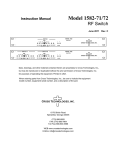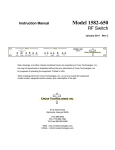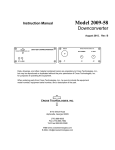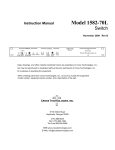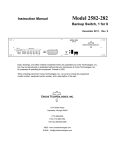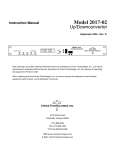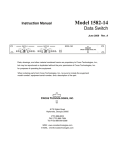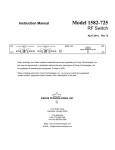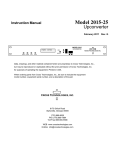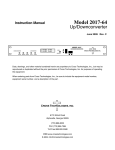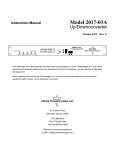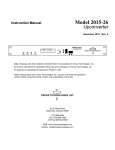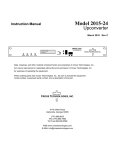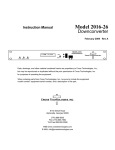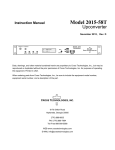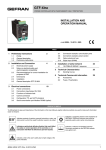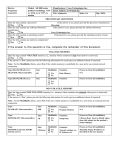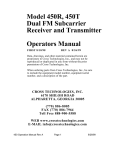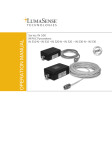Download Manual - Cross Technologies, Inc.
Transcript
Model 2582-324 Instruction Manual Backup Switch - 1 for 2 August 2009 Rev C POWER ALARMS PROT MODE ONLINE / OFFLINE 1 2 3 4 BU P A P M U A P A 2 M STATUS A B 1 2 3 4 BU SW 1 2 3 4 MODEL 2582 SWITCH MENU CROSS TECHNOLOGIES INC. EXECUTE BU Data, drawings, and other material contained herein are proprietary to Cross Technologies, Inc., but may be reproduced or duplicated without the prior permission of Cross Technologies, Inc. for purposes of operating the equipment. Printed in USA. When ordering parts from Cross Technologies, Inc., be sure to include the equipment model number, equipment serial number, and a description of the part. CROSS TECHNOLOGIES, INC. 6170 Shiloh Road Alpharetta, Georgia 30005 (770) 886-8005 FAX (770) 886-7964 Toll Free 888-900-5588 WEB: www.crosstechnologies.com E-MAIL: [email protected] INSTRUCTION MANUAL MODEL 2582-324 Switch TABLE OF CONTENTS Warranty 1.0 General 1.1 Equipment Description 1.2 Technical Characteristics 1.3 Monitor & Control Interface 2.0 Installation 2.1 Mechanical 2.2 Rear I/O’s 2.3 Front Panel Controls, Indicators 2.4 Operation 2.5 Menu Settings 3.0 Environmental Use Information PAGE 2 3 3 4 5 7 7 8 9 10 11 15 WARRANTY - The following warranty applies to all Cross Technologies, Inc. products. All Cross Technologies, Inc. products are warranted against defective materials and workmanship for a period of one year after shipment to customer. Cross Technologies, Inc.’s obligation under this warranty is limited to repairing or, at Cross Technologies, Inc.’s option, replacing parts, subassemblies, or entire assemblies. Cross Technologies, Inc. shall not be liable for any special, indirect, or consequential damages. This warranty does not cover parts or equipment which have been subject to misuse, negligence, or accident by the customer during use. All shipping costs for warranty repairs will be prepaid by the customer. There are not other warranties, express or implied, except as stated herein. CROSS TECHNOLOGIES, INC. 6170 Shiloh Road Alpharetta, Georgia 30005 (770) 886-8005 FAX (770) 886-7964 Toll Free 888-900-5588 WEB www.crosstechnologies.com E-MAIL [email protected] 2582-324 Manual,Rev. C Page 2 8/05/09 MODEL 2582-324 Switch, 1 for 2 1.0 General 1.1 Equipment Description The 2582-324 1 for 2 Switch with Backup Controller provides Auto or Manual backup protection for up to 2 converters by relay switching two IF and one RF signal from a backup unit to any of 2 on-line units. The controller in the 2582-324 monitors alarms and settings of the on-line units and sets the backup unit to the parameters of the unit being backed up prior to backing it up. The 2582-324 works with standard Cross up and downconverters by polling their monitor and control ports on a periodic basis. A defective unit’s inputs and outputs are switched from the failed unit to the backup when a failure occurs either automatically or manually. “On-line”, “off-line” and “not used” modes can be programmed for each on-line converter. Alarms are contact closures to ground. Status of the 2582-324 is via a serial data stream and a contact closure to ground on alarm. All settings are stored in nonvolatile ROM and on power up the 2582-324 polls all units. Manual Select is controlled by the multi-function switches on the front panel. LEDs indicate alarm and switch conditions. The unit is powered by two 100-240 ± 10% VAC redundant power supplies, and housed in a 2RU chassis. POWER ALARMS PROT MODE ONLINE / OFFLINE 1 2 BU P A P M 2 M B 1 2 BU SW 1 2 SWITCH CROSS TECHNOLOGIES INC. EXECUTE STATUS A MODEL 2582 MENU BU FRONT PANEL CH1 CONV CH2 IN/OUT CONV BU IN/OUT CONV IN/OUT RF AC A AC B J11 J12 J21 J22 J1 J2 CONV IN/OUT CONV IN/OUT CONV IN/OUT IF 1 GND J13 J14 J23 J24 J3 J4 CONV IN/OUT CONV IN/OUT CONV IN/OUT J15 J16 J25 J26 J5 J6 IF 2 TOP - ONLINE 1 BOT - ONLINE 2 TOP - BACK UP BOT - SWITCH REAR PANEL FIGURE 1.1 Model 2582-324 Front and Rear Panels CH 1 CH 2 IN/ CH 1 IN/ CH 2 OUT CONV OUT CONV J12 J11 J22 J21 NO RF SWITCHING ON DOWNCONVERTER SIDE. USE CUSTOMER SUPPLIED EXTERNAL RF SPLITTER ON DOWNCONVERTER RF. BU IN/OUT J2 BU CONV J1 BU CONV J3 BU IN/OUT J4 BU CONV J5 BU IN/OUT J6 CH 2 CONV J23 CH 2 IN/OUT J24 CH 2 CONV J25 CH 2 IN/OUT J26 CH 1 CONV J13 CH 1 IN/OUT J14 CH 1 CONV J15 CH 1 IN/OUT J16 CONTROLLER AND MEMORY UPCONVERTER SWITCHING UNIT UNIT 1 2 BU SW UNIT ALARM N/C DOWNCONVERTER SWITCHING |----- REMOTE and ALARM -----| 2582-324 Manual,Rev. C Page 3 8/05/09 FIGURE 1.2 Model 2582-324 Switch Block Diagram 1.2 Technical Characteristics TABLE 1.0 2 582-324 Switch Specifications* L-Band Switch Characteristics Impedance 50 Return Loss > 12 dB Type Relay Isolation > 55 dB, DC to 1.5 GHz; > 50 dB, to 2.2 GHz; Switch time 100 milliseconds Insertion Loss 1.5 dB, to 1.5 GHz; 2.0 dB, to 2.2 GHz Configuration 1 for 2, no termination RF Switch Characteristics Impedance 50 Return Loss > 12 dB Type Relay Isolation > 60 dB, to 15 GHz Switch time 100 milliseconds Insertion Loss 1.5 dB, to 8 GHz; 2.0 dB, to 15 GHz Configuration 1 for 2, no termination Controls, Indicators Manual Selection Push-button switches Remote Selection RS 232C/422/485 (selectable), 9600 baud Power Green LEDs Alarms Red LEDs Online/Offline Green LEDs Other RF Connectors SMA (female) L-Band Connectors BNC (female) Alarm/Remote Connectors DB9 (female) Size 19 inch, 2RU standard chassis 3.5”high X 16.0” deep Power 100-240 ± 10% VAC, 47-63 Hz, 45 watts max; Redundant power supplies *+10˚C to +40˚C; Specifications subject to change without notice 2582-324 Manual,Rev. C Page 4 8/05/09 1.3 Monitor and Control Interface A) Remote serial interface Protocol: RS-232C/422/485, 9600 baud rate, no parity, 8 data bits, 1 start bit, and 1 stop bit. Connectors: Rear panel, DB-9 female SWITCH Pinouts Pino outs (RS-232C/422/485) Pin CH1,CH2,CH3,CH4,BU CH1,CH2,CH H3,CH4,BU Pinouts Pin Function Function 1 Rx- 1 Tx- 2 Rx+ (RS-232C) 2 Tx+ (RS-232C) 3 Tx+ (RS-232C) 3 Rx+ (RS-232C) 4 Tx- 4 Rx- 5 GND 5 GND 6 Alarm Relay: Common 6 Alarm Relay: Common 7 Alarm Relay: Normally Open 7 Alarm Relay: Normally Open 8 Not Used 8 Not Used 9 Alarm Relay: Normally Closed 9 Alarm Relay: Normally Closed B) Status Requests Table 1.1 lists the status requests for the 2582-324 and briefly describes them * PLEASE NOTE: The two character {aa}(00-31) prefix, in the table below, should be used ONLY when in RS-485 mode. TABLE 1.1 2582-324 Status Requests Command Syntax * Description Command Status {aaS1} Returns {aaS1bcdefghi} where: • b = BACK-UP Status 0 = Normal, no channels backed up 1 = CH1 is currently backed up 2 = CH2 is currently backed up • c = CH1 Status -- 0 = protected, 1 = unprotected • d = CH1 Mode -- 0 = AUTO, 1 = MANUAL, 2 = REMOTE • e = CH2 Status -- 0 = protected, 1 = unprotected • f = CH2 Mode -- 0 = AUTO, 1 = MANUAL, 2 = REMOTE • g = CH1 Alarm -- 0 = normal, 1 = alarm • h = CH2 Alarm -- 0 = normal, 1 = alarm • i = BACK-UP Alarm -- 0 = normal, 1 = alarm • j = Power Supply A Alarm -- 0 = normal, 1 = alarm • k = Power Supply B Alarm -- 0 = normal, 1 = alarm Min. Auto Switching Status {aaS5} Returns {aaS5b} where: • b = Minimum Auto Switching mode status 0 = Normal, Min. Auto Switching OFF 1 = Min. Auto Switching ON C) Commands Table 1.2 lists the commands for the 2582-324 and briefly describes them. After a command is 2582-324 Manual,Rev. C Page 5 8/05/09 sent the 2582-324 sends a return “>” indicating the command has been received and executed. General Command Format - The general command format is {aaCND...}, where: { = start byte aa = address (only used if in RS-485 mode) C = 1 character, either C (command) or S (status) N = 1 character command or status request D = 1 character or more of data (depends on command) } = stop byte * PLEASE NOTE: The two character {aa}(00-31) prefix, in the table below, should be used ONLY when in RS-485 mode. Table 1.2 2582-324 Commands Comman nds Command Syntax* Description Set CH1 Status and Mode {aaC1xy} where: • x = 0; CH1 Protected • x = 1; CH1 Unprotected • y = 0; set CH1 to AUTO mode • y = 1; switch BACK-UP to CH1 Set CH2 Status and Mode {aaC2xy} where: • x = 0; CH2 Protected • x = 1; CH2 Unprotected • y = 0; set CH2 to AUTO mode • y = 1; switch BACK-UP to CH2 Set Min. Auto Switching Mode {aaC5x} where: • x = 0; Minimum Auto Switching DISABLED • x = 1; Minimum Auto Switching ENABLED Reset Switch Position {aaC6x} where: • x = 1; Reset Switch Position after the switch position changed in Minimum Auto Switching mode All external units (1, 2, and backup) can be controlled remotely via the 2582 switch. Converters to be controlled must be in RS-422 remote mode. Simply enter a prefix of *1, *2, or *5 for units 1, 2, or backup, respectively, before entering the corresponding unit’s status request or command. For example, to send a status command of S1 to converter #1 you would enter {aa*1S1}, where the address, aa, would only be necessary if the 2582 were in RS-485 mode. Any returned status will also be prefixed with a *1, *2, or *5. 2582-324 Manual,Rev. C Page 6 8/05/09 2.0 Installation 2.1 Mechanical The 2582-324 consists of two IF or L-Band Switching PCBs, one Controller PCB, and two baseball switches housed in a 2 RU (3 1/2 inch high) by 16 inch deep chassis. Two redundant switching, ± 12, +24, +5 VDC power supplies provide power for the assembly. The 2582-324 can be secured to a rack using the 4 holes on the front panel. Figure 2.0 shows how the 2582-324 is assembled. IF SWITCH PCB POWER SUPPLY B SWITCH SWITCH POWER SUPPLY A CONTROLLER PCB FIGURE 2.0 2582-324 Mechanical Assembly 2582-324 Manual,Rev. C Page 7 8/05/09 2.2 Rear Panel Input/Output Signals Figure 2.1 shows the input and output connectors on the rear panel. IF 1 SIGNALS Signals to/from Unit #1 to #4 and the Backup Unit CONV goes to the up/down converter IN/OUT is the input to or the output from the converter. BNC (female) 50. RF SIGNALS Signals to/from Unit #1 to #4 and the Backup Unit CONV goes to the up/down converter IN/OUT is the input to or the output from the converter. SMA (female) 50. CH1 SWITCH M&C Monitor and controls for the 2582 switch. AC A BU MONITOR Monitor and controls for the Back-Up unit. CONV CH2 IN/OUT CONV BU IN/OUT CONV IN/OUT RF AC B J11 J12 J21 J22 J1 J2 CONV IN/OUT CONV IN/OUT CONV IN/OUT IF 1 GND J13 J14 J23 J24 J3 J4 CONV IN/OUT CONV IN/OUT CONV IN/OUT J15 J16 J25 J26 J5 J6 IF 2 TOP - BACK UP BOT - SWITCH TOP - ONLINE 1 BOT - ONLINE 2 AC1, AC2 - POWER IN AC inputs for redundant switching power supplies. 100-240 ±10% VAC, 47-60 Hz. CH1 and CH2 MONITOR Monitor and controls for Unit #1 and Unit #2. IF 2 SIGNALS Signals to/from Unit #1 to #4 and the Backup Unit CONV goes to the up/down converter IN/OUT is the input to or the output from the converter. BNC (female) 50. FIGURE 2.1 2582-324 Rear Panel I/Os TABLE 2.2 CH1,CH2,BU Pinouts TABLE 2.1 SWITCH SWITCH Pinouts (RS-232C/422/485) Pin Pin Function 1 Rx- 2 Rx+ (RS-232C) 3 Tx+ (RS-232C) 4 Tx- 5 GND 6 Alarm Relay: Common 7 Alarm Relay: Normally Open 8 Not Used 9 Alarm Relay: Normally Closed Function 1 Tx- 2 Tx+ (RS-232C) 3 Rx+ (RS-232C) 4 Rx- 5 GND 6 Alarm Relay: Common 7 Alarm Relay: Normally Open 8 Not Used 9 Alarm Relay: Normally Closed *Remote Serial Interface Interface: DB-9 Male Protocol: RS-232C/422/485, 9600 baud rate, no parity, 8 data bits, 1 start bit, 1 stop bit. 2582-324 Manual,Rev. C Page 8 8/05/09 2.3 Front Panel Controls and Indicators Figure 2.2 shows the front panel controls and indicators. DS1,DS2 - PWR LEDs Green LEDs indicate DC voltage from each power supply. DS3 to DS8 - ALARM LEDs Red LEDs indicate alarm state for Units #1, #4, Back-Up Unit, and the 2582 switch. POWER ALARMS LCD DISPLAY S1 - MENU/EXECUTE BUTTON Display shows if CH1 and CH4 are protected or Press this to get into Program mode not, what mode CH1 and CH4 are in (AUTO, and to execute any changes. MANUAL, REMOTE), and which channel is being backed up (if any). PROT MODE ONLINE / OFFLINE 1 2 BU P A P M 2 M STATUS A B 1 2 BU SW 1 2 MENU EXECUTE BU DS9 to DS13 - ONLINE LEDs Green LEDs for CH1 to CH4 indicate they are online and not being backed up. Green LED for BU indicates a unit is being backed up. S2 - VERT. TOGGLE Vertical toggle switch that controls values in the Menu items when in program mode. Does not function in the normal display mode S3 - HORIZ. TOGGLE Horizontal toggle switch that controls which values are being adjusted. Does not function in the normal display mode FIGURE 2.2 2582-324 Front Panel Controls and Indicators 2582-324 Manual,Rev. C Page 9 8/05/09 2.4 Installation / Operation 2.4.1 Installing and Operating the 2582-324, Switch Section 1. Connect Converters (CH1, CH2, BU) to respective channels on the 2582 (Figure 2.1). 2. Connect Alarm/Control cables from Converters to respective monitors on the 2582 (Figure 2.1). 3. Connect two 100-240 ± 10% VAC, 47 - 63 Hz power cords to AC A and AC B on the back panel (Figure 2.1). 4. Set which unit(s) you wish to protect and the mode for each unit (See Section 2.5 Menu Settings). 5. Be sure DS1 & DS2 (green, DC Power) are on and DS3 to DS8 (red, Alarm) are off (Figure 2.2). 6. AC Fuses - The fuses are 5 mm X 20 mm, 2 amp slow blow (Type T) and are inserted in the far slot in the drawer below the AC inputs as shown in Figure 2.3. There is a spare fuse in the near slot. If a fuse continues to open, the corresponding power supply is most likely defective. FUSE DRAWER SPARE FUSE DRAWER AC Fuse - 2 amp slow blow (Type T), 5 mm X 20 mm INPUT ~ 100-240± 10%VAC 47-63 Hz 2A MAX FUSE TYPE T 2A GDC 250 VOLT FOR 100 - 240 V~ FIGURE 2.3 Fuse Location and Spare Fuse 2582-324 Manual,Rev. C Page 10 8/05/09 2.5 Menu Settings 2.5.1 Functions - This section describes operation of the front panel controls. There are three operator switches, the LCD display and alarm indicator LEDs. All functions for the equipment are controlled by these components. The functions are (see Figure 2.4): Power Up Normal Display Power Up Normal Display Menu 1 Menu 2 Menu 3 Menu 4 Menu 5 Menu 6 Menu 7 Menu 8 Set CH1 Protected/Unprotected Set CH1 Mode (MANUAL overrides REMOTE which overrides AUTO) Set CH2 Protected/Unprotected Set CH2 Mode (MANUAL overrides REMOTE which overrides AUTO) Set Remote mode Set RS-485 address Set Minimum Auto Switching Mode ON and OFF Restore Switch Position in Minimum Auto Switching mode Save Menu When “R” is selected or when get to the end Alarm indications appear on the LEDs (see figure 2.2). All program changes must start with the operation of the Menu/Execute switch and must also end with the operation of the Menu/Execute switch verified by the “Save Settings?” Menu. If this sequence is not followed, none of the changes will take effect. If programming is initiated and no operator action takes place for approximately 12 seconds (before the final press of the Menu/Execute switch) the display will revert to its previous status and you will need to start over. 2582-324 Manual,Rev. C Page 11 8/05/09 2.5.2. Power On Settings NOTE:The last status of a unit is retained even when power is removed. When power is restored, the unit will return to it's previous settings. When power is first applied, the LCD display goes through three steps. 1.The LCD goes black to show all segments are functioning. 2.The software version will be displayed. 1 2 BU REV 1.00 STATUS 3.The present protection state and mode of each channel/unit are shown. 1 2 PROT P P MODE A A BU A STATUS The unit is now operational and ready for any changes the operator may desire. 2.5.3 Control Switches 1. Menu/Execute - Any change to the programming of the unit must be initiated by pressing the Menu/Execute switch and completed by pressing the Menu/Execute switch. 2. Horizontal Switch - This switch is mounted so its movement is horizontal and moves the cursor left or right. 3. Vertical Switch - This switch is mounted so its movement is vertical, and changes settings in each menu. 2.5.4 Alarm Indications An alarm condition will occur if the corresponding unit’s local oscillator phase lock loop (PLL) comes out of lock (when connected properly). 2582-324 Manual,Rev. C Page 12 8/05/09 ON POWER UP REV 1.00 Power Up NORMAL DISPLAY PROT MODE Normal Display 1 2 3 4 BU P A P A P A P A A PUSH BUTTON STATUS PUSHING MENU/EXECUTE SEQUENCE Menu 1 Set CH1 protection CH1 = _ Protected R Menu 2 Set CH1 mode CH1 = _ Auto R Menu 3 Set CH2 protection CH2 = _ Protected R Menu 4 Set CH2 mode CH2 = _ Auto R Menu 5 Set Remote Mode Menu 6 Set RS-485 Address Menu 7 Set Min. Auto Switching Menu 8 Restore Switch Save? When “R” is selected from any above menu or at the end RS 485 SCROLL <> SCROLL SCROLL <> SCROLL R R SCROLL Restore Sw=OFF R SCROLL <> Y N PUSH BUTTON SCROLL <> Swiching=ON SAVE SETTINGS? PUSH BUTTON SCROLL <> SCROLL Minimum Auto PUSH BUTTON SCROLL <> SCROLL ADDRESS = 00 PUSH BUTTON SCROLL <> SCROLL R PUSH BUTTON SCROLL <> SCROLL OFF PUSH BUTTON PUSH BUTTON SCROLL PUSH BUTTON SCROLL <> PUSH BUTTON FIGURE 2.4 Menu Display and Sequences 2.5.5 Minimum Auto Switching Mode 2582-324 Manual,Rev. C Page 13 8/05/09 Enabling and Disabling The Minimum Auto Switching mode is enabled and disabled via a front panel menu. The Minimum Auto Switching mode can also be enabled and disabled via the following M&C command: {C5x} Where x=1 to enable and x=0 to disable. The status of the 2582-3xx’s Minimum Auto Switching mode setting can be queried by sending the following command: {S5} Which returns {S5x} where x=1 if enabled and x=0 if disabled. Operation In the Minimum Auto Switching mode the switch will remain in a backup state after an alarm event - even if the alarm event that caused the unit to switch has been cleared. The main display will show an “H” under the BU MODE after an alarm causes the switch to change states while in the Minimum Auto Switching mode. The unit can be restored to the normal state via a front panel restore command or an M&C restore command. The front panel Restore Switch menu appears after the Minimum Auto Switching mode ON/OFF menu only if the Minimum Auto Switching mode is on. The switch can also be Restored via the following M&C command: {C6x} Where x=1 to Restore. NOTE: The switch will automatically restore - as soon as the alarm event that caused the unit to switch has been cleared - IF the Minimum Auto Switching mode is disabled either via the front panel setting or by the M&C command. 2582-324 Manual,Rev. C Page 14 8/05/09 3.0 Environmental Use Information A. Rack-Mounting - To mount this equipment in a rack, please refer to the installation instructions located in the user manual furnished by the manufacturer of your equipment rack. B. Mechanical Loading - Mounting of equipment in a rack should be such that a hazardous condition does not exist due to uneven weight distribution. C. Elevated Operating Ambient Temperature - If installed in a closed or multi-unit rack assembly, the operating ambient temperature of the rack may be greater than room ambient temperature. Therefore, consideration should be given to Tmra. D. Reduced Air Flow - Installation of the equipment in a rack should be such that the amount of air flow required for safe operation of the equipment is not compromised. Additional space between unit may be required. E. Circuit Overloading - Consideration should be given to the connection of the equipment to the supply circuit and the effect that overloading of circuits could have on over current protection and supply wiring. Appropriate consideration of equipment name plate rating should be used, when addressing this concern. F. Reliable Earthing - Reliable earthing of rack-mounted equipment should be maintained. Particular attention should be given to supply connections other than direct connection to the Branch (use of power strips). G. Top Cover - There are no serviceable parts inside the product so, the Top Cover should not be removed. If the Top Cover is removed the ground strap and associated screw MUST BE REINSTALLED prior to Top Cover screw replacement. FAILURE TO DO this may cause INGRESS and/or EGRESS emission problems. 2582-324 Manual,Rev. C Page 15 8/05/09 CROSS TECHNOLOGIES, INC. 6170 Shiloh Road Alpharetta, Georgia 30005 (770) 886-8005 FAX (770) 886-7964 Toll Free 888-900-5588 WEB www.crosstechnologies.com E-MAIL [email protected] Printed in USA 2582-324 Manual,Rev. C Page 16 8/05/09
















